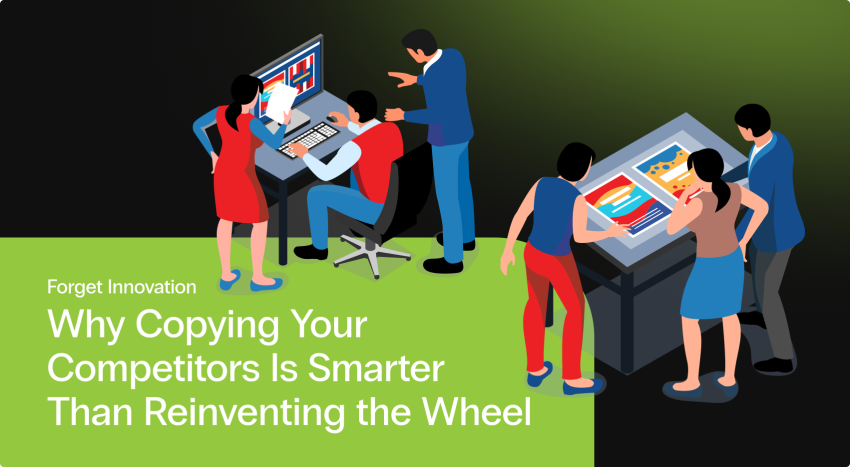Forget Innovation: Why Copying Your Competitors Is Smarter Than Reinventing the Wheel
Innovation is often hailed as the holy grail of business success. You’ve probably heard phrases like “disrupt or be disrupted” or “invent the next big thing.” But here’s the truth: not every business needs to innovate to succeed. Sometimes, the smartest move is to copy what’s already working.
This isn’t about stealing ideas; it’s about recognising that proven strategies can save you time, reduce risk, and provide a reliable foundation for growth. Instead of trying to reinvent the wheel, focus on executing existing ideas better than anyone else.

The Problem with the Obsession for Innovation
Innovation comes with high stakes. While some groundbreaking ideas succeed, many more fail—and the cost of failure can be devastating for small businesses. Here’s why the obsession with originality can be a trap:
- It’s Expensive:
- Research and development require significant time and financial investment.
- It’s Risky:
- New ideas don’t always resonate with the market. Failure rates for startups with “disruptive” concepts are alarmingly high.
- It Slows You Down:
- While you’re perfecting your groundbreaking idea, competitors who focus on tried-and-true methods are already generating revenue.
Why Copying Makes Sense
Copying successful competitors isn’t about being lazy—it’s about being smart. Here’s why leveraging proven strategies works:
- Lower Risk:
- If a strategy or product is working for someone else, there’s a good chance it will work for you too.
- Faster Execution:
- You can skip the trial-and-error phase and get to market quickly.
- Focus on Improvement:
- Instead of starting from scratch, you can refine and enhance existing ideas to make them your own.
Case Study: Aldi
Aldi, the German supermarket chain, is a perfect example of copying done right. Instead of inventing its own retail model, Aldi borrowed heavily from successful grocery chains while focusing on efficiency and cost-cutting. By simplifying its product offerings, using private-label goods, and prioritising operational efficiency, Aldi carved out a niche in the competitive supermarket industry.
Today, Aldi operates in multiple countries and continues to grow by executing proven retail strategies better than most competitors (Source: Financial Review).
How to Copy Smartly
Copying doesn’t mean blindly replicating what others are doing. Here’s how to do it effectively:
- Study Your Competitors:
- Identify what they’re doing well and why it’s working.
- Understand the Market Fit:
- Make sure the strategy or product aligns with your target audience.
- Add Your Twist:
- Improve on the existing idea by adding value or solving an overlooked pain point.
- Execute Flawlessly:
- Success often lies in execution. Focus on delivering better quality, service, or efficiency.
The Role of Execution
Execution is where the magic happens. A copied idea executed with excellence will outperform a groundbreaking idea poorly implemented. Consider companies like Uber and Airbnb. While neither invented ride-sharing or short-term rentals, they refined existing concepts and executed them better than anyone else, turning them into billion-dollar businesses.
Action Plan: Leveraging Proven Strategies
Here’s how to incorporate this approach into your business:
- Perform a Competitor Analysis:
- Identify top players in your industry and analyse their strengths and weaknesses.
- Pinpoint Opportunities:
- Look for gaps in the market or ways to enhance existing offerings.
- Test and Iterate:
- Start small, gather feedback, and refine your approach.
- Stay Customer-Focused:
- Ensure that every improvement aligns with your customers’ needs and expectations.
- Scale Wisely:
- Once you’ve perfected the copied strategy, scale it for greater impact.
Embrace the Smart Copycat Mentality
Innovation has its place, but it’s not the only path to success. By focusing on what’s already proven to work and executing it exceptionally well, you can save time, reduce risk, and achieve sustainable growth.
Remember, the goal isn’t to reinvent the wheel—it’s to make the best wheel on the market. So, look around, learn from your competitors, and focus on doing it better. Your customers won’t care if you’re the first—they’ll care that you’re the best.



